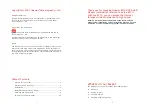
6 Commands
A description of the parameter follows:
0 Low
tones
1400 Hz = Mark frequency.
1200 Hz = Space frequency.
If
TR
= 0 (default), in RTTY and AMTOR the TRX must be set to USB operation.
1 High
tones
2100 Hz = Mark frequency.
2300 Hz = Space frequency.
If
TR
= 0 (default), in RTTY and AMTOR the TRX must be set to LSB or FSK
2
The freely definable
MArk
and
SPAce
tones are used. We recommend
TR
to be set
to 0 and to operate using USB, whereby the Mark frequency should always be higher
than the Space frequency. Using this convention allows the higher AF, as well as the
higher
HF frequency
to represent the Mark condition, and Logic 1 in RTTY and
AMTOR With PACTOR, the shift direction plays no part in the decoding, as the
correct relationship is always obtained at the start of the link.
3 PACTOR-III
1200/1400
Hz
Call (dial) tones for PACTOR-III link setup
4
PACTOR-III (recommended setting)
1400/1600
Hz
Call (dial) tones for PACTOR-III link setup
5 PACTOR-III
1600/1800
Hz
Call (dial) tones for PACTOR-III link setup
6.97
TR
Default setting: 0
Parameter: 0 TX and RX shift normal.
1 Only RX shift reverse.
2 Only TX shift reverse.
3 TX and RX shift reverse.
Only valid for RTTY and AMTOR.
Inverts the TX and RX audio shift (mark and space tones).
6.98
TXDelay
Default setting: 4
Parameter: X 1... 31, PTT delay in X
•
5 msec.
Sets the TX keying delay (x times 5 ms). The TX keying delay (TXDelay) is the time
between activating the PTT and the sending of the first data.
83
Summary of Contents for PTC-IIex
Page 14: ...List of Figures and Tables XII...
Page 30: ...3 Installation 16...
Page 108: ...7 Audio 94...
Page 126: ...8 FAX 112...
Page 173: ...12 SYStest 159...
Page 183: ...14 Circuit Description 169...
Page 195: ...15 Basics 181...
Page 201: ...B Technical Data 187...
Page 202: ...C Layout Appendix C 19 Layout B 1 Motherboard Figure B 1 Motherboard 188...
Page 203: ...C Layout 189...
Page 215: ...Index 202...
















































